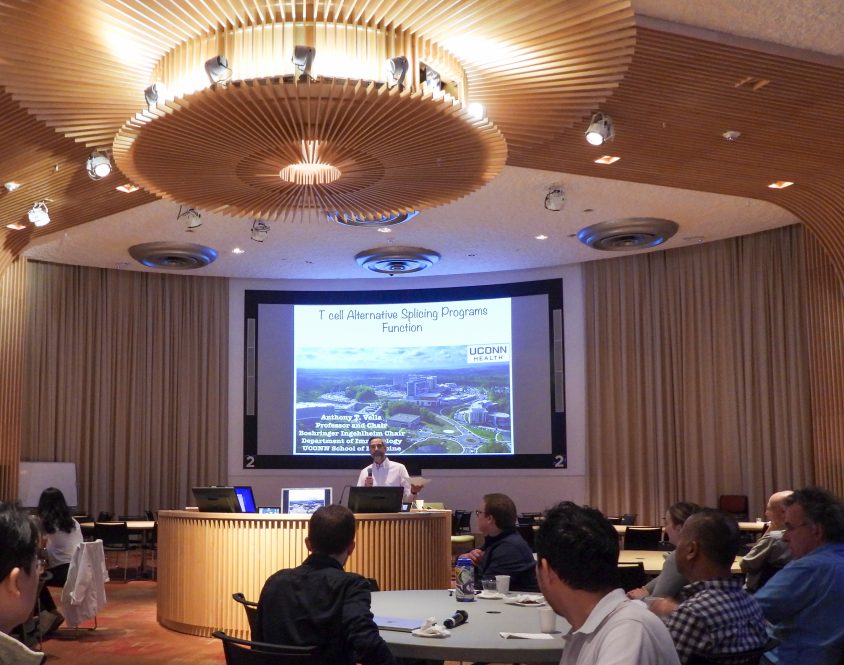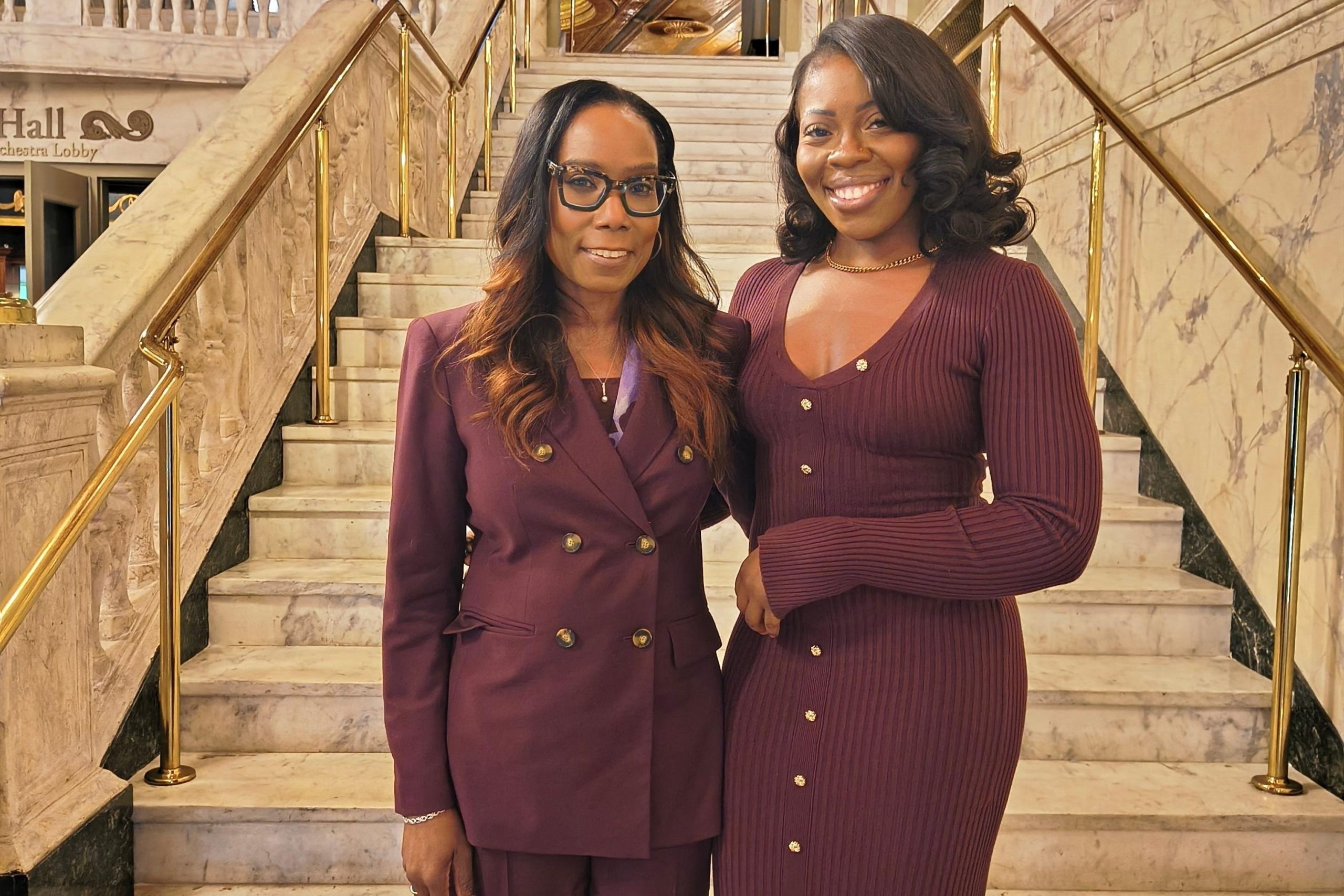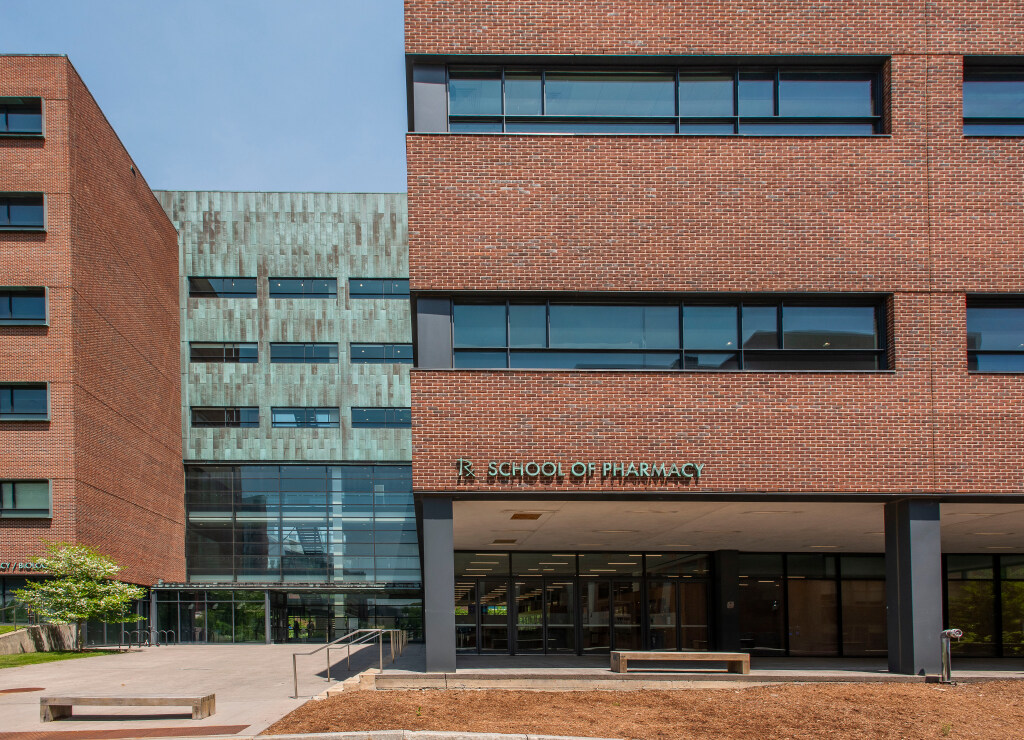On Friday, June 13, UConn Health hosted the third biannual Immunology, Metabolism, and Nutritional Sciences Symposium, with researchers presenting and discussing their cutting-edge work in these interconnected fields.
Anthony Vella, the Boehringer Ingelheim Chair in Immunology at UConn Health, and Ji-Young Lee, head of the UConn Department of Nutritional Sciences, have co-organized the symposium every two years since 2019. The event fuses their two disciplines – the study of the immune system and the science of nutrition – and considers the unique scientific potential that is unlocked at this intersection.
“You really have to have an integrated understanding of multiple systems,” Vella says. “The immune system engages the metabolic pathways, and everyone knows that metabolism and the immune system are impacted by nutrition. We’re trying to set the stage for integrating these ideas into a better understanding of how to really effectively prompt the immune system to fight disease.”
Each iteration of the symposium has a distinct focus, says Vella, reflecting trends in scholarship and collaborative efforts between the two schools. In 2019, for instance, the focus was on the gut microbiome; this year, immunology took center stage, riding a wave of recent breakthroughs in the field.
Immuno-oncology, a type of medical therapy which uses the body’s own immune system to fight cancer, and applied immunology, which uses insights from immunological research to develop vaccines and medications, have both been making headlines in the scientific community and beyond. Earlier this month, the New York Times reported that patients achieved remission from multiple myeloma – an aggressive form of blood cancer typically considered incurable – with CAR T-cell therapy, an immunotherapy that programs the body’s own white blood cells to attack cancerous cells.
“We’re treating cancer almost like it’s a chronic illness now; 20, 30 years ago, it was a whole other story,” says Vella, whose research focuses on T-cell and inflammation biology. “And it’s really important to understand how this progress came about. In my eyes, it’s really through the fundamental understanding of how the immune system works.”
In addition, says Lee, the entire medical field is now gaining a more advanced understanding of the important role nutrition plays in health.
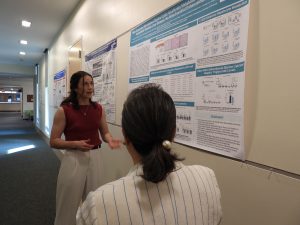
“Food is medicine,” she says. “I think our healthcare system in the United States has historically had a primary focus on treatment, rather than prevention, but now there is a shift happening. People are recognizing the importance of nutrition in prevention, as well as in the treatment phase – what patients are consuming can really impact the effectiveness of the treatments they receive.”
Still, though, there is work to be done in closing the gap between researchers and clinicians. This symposium is one important step, says Clinton Mathias, associate professor of nutritional immunogenetics in the Department of Nutritional Sciences, who presented his research at the event.
“A symposium like this helps make those connections stronger for everybody involved, especially at a venue like the Health Center and at the medical school, where there are medical students and physicians attending,” he says.
Helping the Body Heal Itself
The symposium’s featured speakers were Moshe Biton and Atan Gross, chair and professor, respectively, of the Department of Immunology and Regenerative Biology at the Weizmann Institute of Science in Israel.
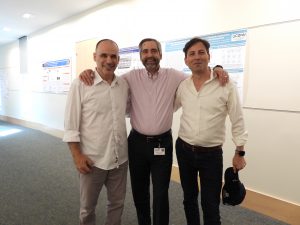
Biton’s research focuses on understanding epithelial, stem, and immune cell interactions in the gut, which can result in conditions like inflammatory bowel disease, cancer, and allergies.
Gross’s research focuses on the mitochondria – organelles within cells which create energy for the body and regulate metabolism – and how they can be supported to help slow down disease progression in neurodegenerative diseases such as Parkinson’s.
“I am delighted that this symposium involves researchers from the Weizmann Institute of Science in Israel and look forward to continuing to build this partnership,” says UConn Vice President for Global Affairs Daniel Weiner, who led the effort to bring these researchers to speak at the symposium.
From the UConn Health Department of Immunology, professors Beiyan Zhou and Vijay Rathinam each presented their research on new approaches for understanding immune function. Both researchers are members of the Connecticut Academy of Science and Engineering (CASE), elected in recognition of their outstanding contributions to their fields.
Zhou, who investigates obesity-induced health risks, is the associate director of the Immunology Graduate Program (IGP) at UConn Health. She presented her work on “Developing computational programs to investigate immune cell function in human diseases.”
Zhou spoke to recent challenges and possibilities arising with the advance of single-cell multi-omics, where researchers analyze multiple types of molecular data from an individual cell. Her presentation also foregrounded her lab’s efforts to create innovative computational tools to integrate deep learning strategies for biomedical discoveries.
“Biomedical datasets inherit unique challenges for data mining, such as large volumes of molecular and clinical factors versus relatively small sample size,” she says. In response to this issue, her lab has developed “a set of cell-function guided tools and applied them for prediction models for human diseases and treatment responses.”
It’s about exchanging ideas, working with each other, collaborating, and really pushing each other to be the best scientists we can be.
Rathinam’s presentation explored “Innate Immune Paths to Inflammation.” Rathinam is a veterinarian-turned-immunological-researcher whose efforts to understand the immunologic basis of infectious and inflammatory diseases have landed him among the world’s most highly cited researchers.
“My lab studies how our body senses infection and triggers inflammation, and how inflammation impacts human health and diseases. We are exploring ways to integrate metabolic perspectives into our research,” says Rathinam. “[This symposium] is a great effort to bring together researchers studying immunology, metabolism and nutrition given how interconnected these topics are.”
From the UConn Department of Nutritional Sciences, Mathias shared his research on interleukin 10, an immune molecule which he found could stimulate allergic responses, in the case of food allergies and asthma.
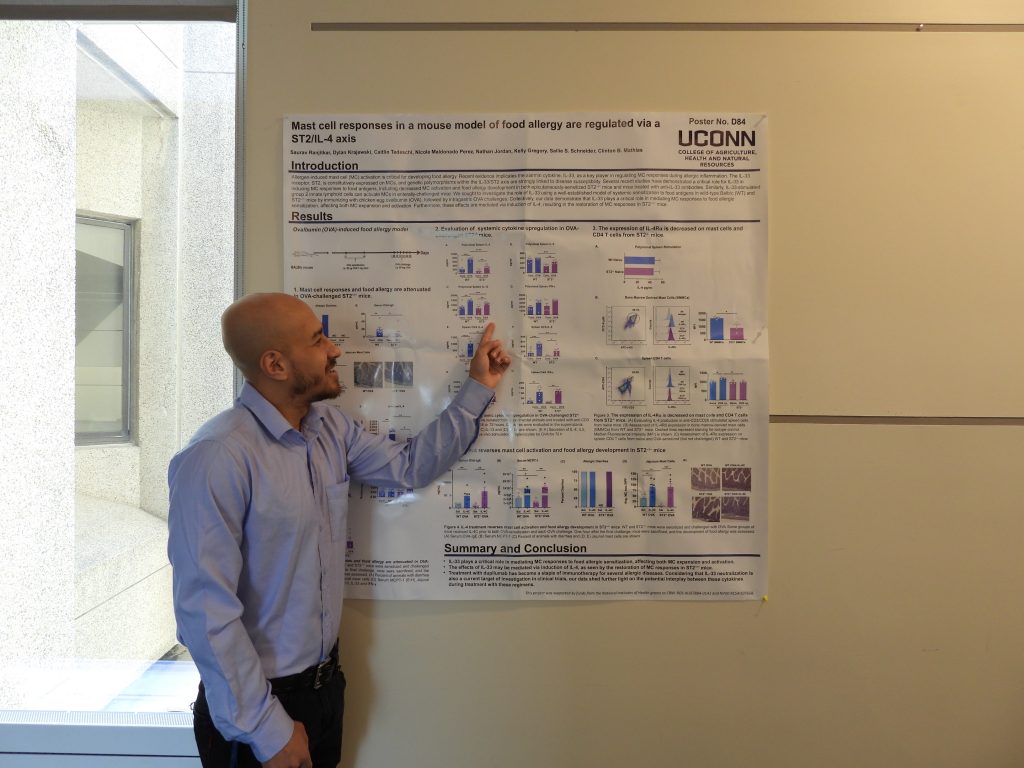
“We’re very interested in the ways dietary factors could potentially impact mast cell behavior and activation during immune responses,” he says.
Sangyong Choi, assistant professor of nutritional sciences, shared his work on zinc metabolism in the body, which plays an important role in supporting immune functions.
“This symposium has helped me think through how I can apply this core concept of a zinc homeostasis mechanism to the immune system, especially in the context of immunosenescence found in aging,” says Choi. “I hope my talk facilitates communication with immunology researchers to further investigate the importance of zinc in immune response.”
Lee presented her research on alcohol-related inflammatory response. When liver cells are exposed to alcohol, she explains, their production of an important enzyme called NAD+ is reduced. Eventually, low levels of NAD+ can lead to liver disease, heart disease, and other serious conditions.
Lee is currently investigating whether compounds called NAD+ precursors could be used as a therapy to help prevent the mitochondrial stress triggered by alcohol, and help people with alcohol-induced liver disease recover.
Her work exemplifies the spirit of the symposium: sharing cross-disciplinary insights into how nutrition can support immune system function and help people live healthier lives.
With their third symposium in the books, Lee and Vella will now turn their attention toward planning the next event – in 2027.
“It’s about exchanging ideas, working with each other, collaborating, and really pushing each other to be the best scientists we can be,” says Vella. “Your scientific ideas, and the quality of your ideas, they grow when you’re challenged. If you’re not challenged, you’re just kind of static. That’s what’s important about a symposium.”
